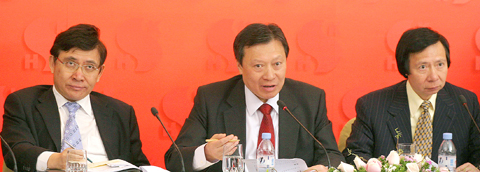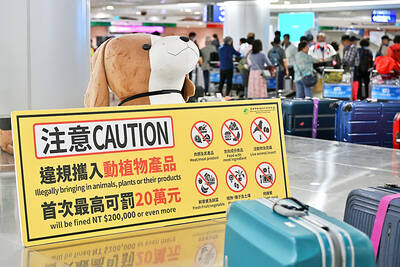Sun Hung Kai Properties Ltd (新鴻基地產), Hong Kong's biggest developer, replaced chairman Walter Kwok (郭炳湘) with his mother, seeking to end a feud that has gripped the city and split its second-richest family.
“Walter has ceased to be the chairman and chief executive of the company and has been re-designated as a non-executive director,” the company said in a filing to Hong Kong’s stock exchange. Kwong Siu-hing (鄺肖卿), 79, was appointed chairman, the company said. No chief executive officer was named.
Sun Hung Kai rose in Hong Kong trading after the decision, extending its rebound from a slump that had erased more than US$4 billion of market value. Walter, who became chairman in 1990 after his father’s death, lost a court battle yesterday to prevent a vote on his ouster, with younger brothers Thomas Kwok (郭炳江) and Raymond Kwok (郭炳聯). Walter, 57, also is suing his siblings for libel.

PHOTO: AFP
“The next question is how the company manages to deal with long-term arrangements,” said Nicole Wong, a property analyst at CLSA Ltd in Hong Kong.
The dispute has aired in court squabbles over the company that built Hong Kong’s tallest skyscraper and is the foundation of the Kwok family’s combined wealth of US$24 billion, second on Forbes Magazine’s list of Hong Kong’s richest only to Li Ka-shing (李嘉誠).
“Investors were obviously concerned about who’s going to be in charge,” Wilson Hung, an analyst at Hong Kong-based brokerage Quam Ltd, said before the announcement. “They were worried that if this keeps dragging on it will ultimately impact the company’s business.”
Sun Hung Kai rose 2 percent to HK$128.20 (US$16.42), heading for the biggest two-day gain in three weeks, as of 2:42pm in Hong Kong.
Listed on the Hong Kong stock exchange in 1972, Sun Hung Kai rode a three-decade surge in home prices to become the city’s biggest developer. Since Walter Kwok took over, the company’s value has ballooned 10-fold and the company now employs more than 27,000 people, its Web site said.
Walter Kwok said in a court filing that his brothers tried to remove him because he was suffering from mental illness. He said he doesn’t have any such disorder.
Walter, who has been on leave for personal reasons since Feb. 18, filed an injunction on May 15 to block the board vote.
Last Wednesday, he sued his brothers for libel, saying they had dubbed him a “liar,” a person of “low integrity” who made “unwise” investment decisions.
They have denied all the allegations.
Hong Kong’s Court of Appeal yesterday upheld a High Court ruling on Friday that canceled a temporary injunction blocking the meeting.
“This court simply cannot dictate to the board who should be their chairman,” Justices Rogers and Le Pichon said in Hong Kong’s appeals court yesterday.

UKRAINE, NVIDIA: The US leader said the subject of Russia’s war had come up ‘very strongly,’ while Jenson Huang was hoping that the conversation was good Chinese President Xi Jinping (習近平) and US President Donald Trump had differing takes following their meeting in Busan, South Korea, yesterday. Xi said that the two sides should complete follow-up work as soon as possible to deliver tangible results that would provide “peace of mind” to China, the US and the rest of the world, while Trump hailed the “great success” of the talks. The two discussed trade, including a deal to reduce tariffs slapped on China for its role in the fentanyl trade, as well as cooperation in ending the war in Ukraine, among other issues, but they did not mention

Japanese Prime Minister Sanae Takaichi yesterday lavished US President Donald Trump with praise and vows of a “golden age” of ties on his visit to Tokyo, before inking a deal with Washington aimed at securing critical minerals. Takaichi — Japan’s first female prime minister — pulled out all the stops for Trump in her opening test on the international stage and even announced that she would nominate him for a Nobel Peace Prize, the White House said. Trump has become increasingly focused on the Nobel since his return to power in January and claims to have ended several conflicts around the world,

REASSURANCE: The US said Taiwan’s interests would not be harmed during the talk and that it remains steadfast in its support for the nation, the foreign minister said US President Donald Trump on Friday said he would bring up Taiwan with Chinese President Xi Jinping (習近平) during a meeting on the sidelines of the APEC Summit in South Korea this week. “I will be talking about Taiwan [with Xi],” Trump told reporters before he departed for his trip to Asia, adding that he had “a lot of respect for Taiwan.” “We have a lot to talk about with President Xi, and he has a lot to talk about with us. I think we’ll have a good meeting,” Trump said. Taiwan has long been a contentious issue between the US and China.

Taiwan’s first African swine fever (ASF) case has been confirmed and would soon be reported to the World Organization for Animal Health (WOAH), Minister of Agriculture Chen Junne-jih (陳駿季) yesterday. The Ministry of Agriculture’s Veterinary Research Institute yesterday completed the analysis of samples collected on Tuesday from dead pigs at a hog farm in Taichung and found they were ASF-positive. Animal and Plant Health Inspection Agency Animal Quarantine Division chief Lin Nien-nung (林念農) said the result would be reported to the WOAH and Taiwan’s major trade partners would also be notified, adding that pork exports would be suspended. As of Friday, all samples